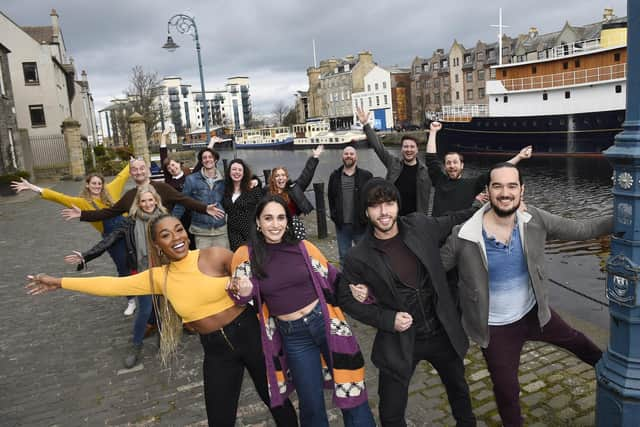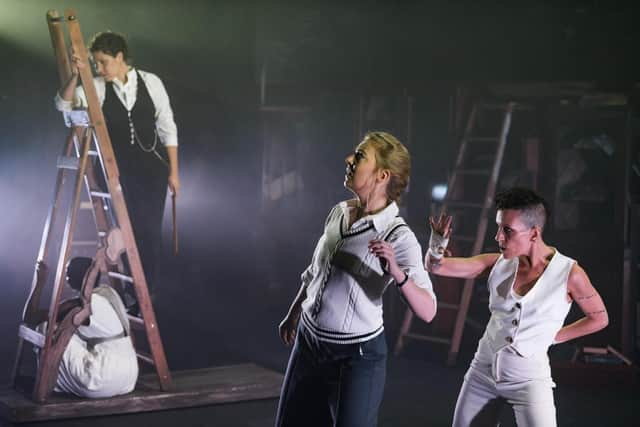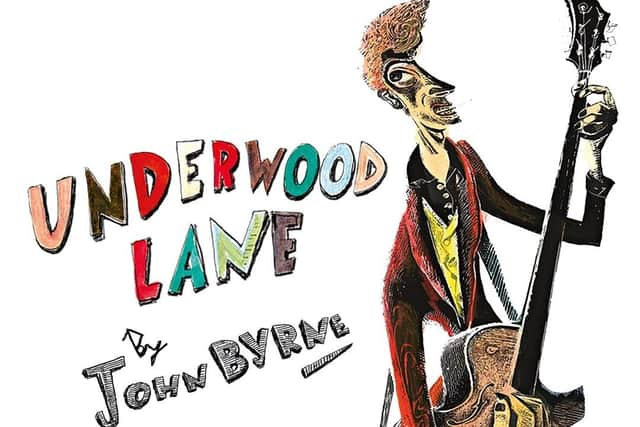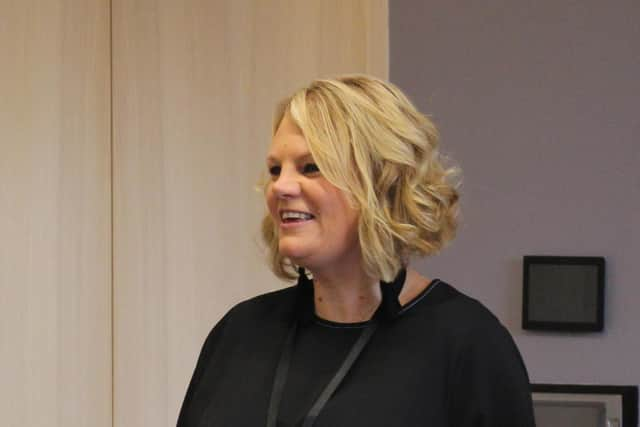Scottish culture faces mixed picture as country emerges from Covid restrictions into cost of living crisis
A combination of postponed shows, festivals and events returning for the first time in three years – and brand new arrivals on the scene – means there is no shortage of choice for audiences across the country.
But, behind the scenes, anticipation and excitement is being tempered by uncertainties and anxieties over the lingering impact of Covid on audience confidence and what the cost of living crisis may mean for ticket sales.
Advertisement
Hide AdAdvertisement
Hide AdNew research paints a mixed picture for the Scottish cultural sector more than two years after the first pandemic lockdown shut down venues, cancelled concert schedules and saw festivals wiped out almost overnight.


A wide-ranging opinion poll has found that one in five Scots is planning to avoid the arts and culture events they would have attended before the pandemic "for the foreseeable future”.
More than a third of people aged 70 and over have ruled out returning to certain events, while 32 per cent of people with a long-term illness or disability said they would avoid them.
Research commissioned by government agency Creative Scotland has revealed deep divisions over the prospect of going back to concerts, plays, dance shows and cinema screenings.
Around 55 per cent of respondents said they were still concerned about the potential health impacts of Covid, although three quarters said they were comfortable with the idea of outdoor events.


Half the population admitted they were concerned about their household finances for the rest of the year, with live music, theatre and cinema trips the most likely to suffer from cutting back on spending.
According to pre-pandemic figures, the arts, culture and creative sectors in Scotland are estimated to have been worth nearly £4 billion to the economy and supporting more than 70,000 jobs in recent years.
Advertisement
Hide AdAdvertisement
Hide AdThe newly-published research, which was conducted in the spring, found half of the Scottish population had attended an “out of home" cultural activity in the previous six months. One in six Scots said arts and culture had become important to them since the first lockdown was ordered in March 2020.
However only around half of those surveyed were happy to return to all the events that they would have gone to before the pandemic.


Trips to the cinema, live concerts, plays and comedy gigs were found to be the events people were most keen to go back to.
However demand was “suppressed” the most for theatre, classical music, literary events, opera and dance shows, according to the research by consultancy 59 Degree Insight, who surveyed 1105 Scots.
People were also found to be more reluctant to go to smaller indoor venues than large-scale arenas, according to the research, which was carried out after restrictions on live events imposed just before Christmas had been eased.
One in three Scots said they had changed plans to attend events, shows or venues over the winter due to concerns over the risk of infection from the Omicron variant or the impact of the Scottish Government’s restrictions.


Around half of those who cancelled plans did so because their event was cancelled and less than 50 per cent reported receiving a full refund.
Advertisement
Hide AdAdvertisement
Hide AdTwo in five respondents said they may avoid booking up any events this year due to the risk of a fresh wave of Covid cases or new restrictions.
Asked if there were any events they would prefer not to attend, either now or in the foreseeable future, one respondent said: “Anything indoors where physical distancing would be compromised because of the numbers of people attending. Also, places with poor natural ventilation.”
Another said: “Any arts and cultural events where people congregate in close proximity. I would be happy to attend such events again when I'm satisfied there's no health risk and if I think they will be worth attending.”
The official report on the research findings states: “Although Scotland has seen the phased easing of Covid-19 lockdown restrictions and undergone an intensive vaccination programme, the impact of Covid-19 is likely to be felt for some time to come.
“Encouragingly, findings show that public comfort levels with attending arts and cultural events and venues are increasing. However, demand remains suppressed compared to pre-pandemic levels.
"In the context of new variants such as Omicron and the rising cost of living, unpredictable periods of vulnerability are an ongoing concern for the creative sectors and may require sector-wide support, planning and resilience."
Fiona Sturgeon Shea, chief executive of the Federation of Scottish Theatre, said: “Because of the strong emphasis on safety employed by them throughout the pandemic, there has been a great deal of loyalty among existing audiences. "Booking patterns have been affected, with late bookings being experienced by several of our members. This seems to be settling down as programming becomes more consistent and not at the same risk of last-minute cancellation as was experienced over the Christmas period.
Advertisement
Hide AdAdvertisement
Hide Ad"Sustained financial support in future is essential to ensure that excellent programming that attracts and enriches audiences and participants continues as a mainstay of Scottish cultural life.
“The cost-of-living crisis is an undeniably serious issue facing the sector and was already having a detrimental effect due to the pandemic and post-Brexit. Emergency funding, whilst hugely welcome in the short-term, is only going to go some of the way to alleviating this.
"Members are reporting deep concerns about how every aspect of the performing arts will be impacted – from the already strained workforce - employed and freelance - to the maintenance of buildings and costs of production.”
Sam Gough, executive director at the Tron Theatre in Glasgow, said: "It's hard to tell whether cost of living increases are having an impact.
"This will perhaps become more evident in our autumn-winter season and beyond, particularly if there are further increases in energy and fuel costs and interest rate rises.
“We introduced a ticketing policy that allows customers to choose what to pay from three options.
“We’ll be continuing to monitor booking patterns and what people choose to pay into our autumn season to see if we can build a better picture of how the wider economic context is impacting on ticket sales.”
Advertisement
Hide AdAdvertisement
Hide AdKris Bryce, executive director at Pitlochry Festival Theatre, said: “Although our physical doors were closed through the pandemic, digital innovation allowed us to never be completely closed off from our audiences. We’ve continued to produce outstanding work and never been out of touch.
“We know that, whilst live performance continues to recover from the impact of the pandemic, some audience members remain anxious about returning.
"Theatre is a shared experience and we can’t wait to welcome everyone back inside. We feel incredibly fortunate to have loyal audiences who join us from across the UK every year.”
Creative Scotland chief executive Iain Munro said: “The Covid-19 pandemic and necessary public health restrictions had an immediate and long-lasting impact on Scotland’s culture sector.
“We commissioned this research in order to stay informed about public attitudes towards attending cultural venues and events, towards creative engagement more generally, and to share this information widely with people and organisations working in the creative sector to inform their planning and programmes of activity. The insight it provides helps our collective efforts to ensure cultural recovery and renewal as we move beyond the most challenging period of the pandemic.”
================================
Eight of the best cultural events to look forward to in Scotland over the next few months
Scotland’s cultural calendar is jam-packed with shows, events and festivals to look forward to this year. Here are eight stand-outs being staged over the next few months.
Advertisement
Hide AdAdvertisement
Hide AdPerth Festival of the Arts, May: More than 40 concerts and events will be staged in seven venues across the city as the event celebrates its 50th anniversary. Its eclectic line-up includes Scottish Opera, Jools Holland, Eddi Reader, the BBC Big Band, Simon Amstell, Jay Rayner, Tommy Smith, and Tom McGuire & The Brassholes.
Sunshine on Leith, Pitlochry and Edinburgh, May-October: The new production of the hit musical will be cause for double celebration when it returns as it will be the final show to be staged at the King’s in Edinburgh before its multi-million pound refurbishment and the first show to bring audiences back into Pitlochry Festival Theatre’s auditorium. Keith Jack and Connor Going lead the cast of the show which uses the songs of The Proclaimers to tell the story of how two soldiers cope after returning to Edinburgh.
Underwood Lane, Tron Theatre, Glasgow, June-July: Delayed by two years by the pandemic, this summer will see the premiere of John Byrne’s new musical theatre production. Written in honour of the late singer-songwriter Gerry Rafferty, and inspired by their upbringing in Paisley, Underwood Lane will follow the exploits of a young skiffle band.
Borders Book Festival, Melrose, June: One of Scotland’s biggest literary events will return to its traditional home of Harmony Garden, in Melrose, for four days of events with leading authors, actors, broadcasters and commentators. Joanna Lumley, Julian Clary, Jack Dee, Clive Myrie, Andrew Marr, Val McDermid, Darren McGarvey and Rory Bremner are among the main attractions.
The Big Top,Royal Highland Showground, Ingliston, June: DF Concerts will stage a series of 8000-capacity shows in the kind of tent normally seen at full-scale musical festivals. James, Biffy Clyro, 50 Cent, the DMA’s, Madness, Fatboy Slim and Richard Ashcroft have been confirmed for The Big Top shows at the home of the Royal Highland Show, which will also return next month.
The Stamping Ground, Eden Court, Inverness, July: Four years after iconic Scottish rock band Runrig bowed out, their fans will get the chance to see their songs and music brought back to life on stage again. The band’s back catalogue has provided the inspiration for Morna Young’s major new stage musical.
Edinburgh festivals, June-August: All the signs are that the Scottish capital is gearing up for one of its biggest ever cultural celebrations this summer, when the International Festival, the Fringe and the Film Festival all mark their 75th anniversary. Big events returning include the Royal Edinburgh Military Tattoo and open-air concerts at Edinburgh Castle esplanade and the Summer Sessions gigs in Princes Street Gardens, while the old Royal High School on Calton Hill reopens for the Hidden Door festival in June.
Advertisement
Hide AdAdvertisement
Hide AdJames IV, September-November, on tour around Scotland: Rona Munro’s original trilogy focusing on three generations of the Stewart kings who ruled Scotland in the 15th century was one of the theatrical events of the year when they premiered in 2014. Eight years later, Munro will reunite with Laurie Sansom, who directed the trilogy while at the helm of the National Theatre of Scotland, for a fourth instalment, which will premiere at the Festival Theatre in Edinburgh.
=====================
We’re in danger of creating a society of two halves and leaving the most vulnerable behind
Catching a show, enjoying live music, going to the cinema or a football match – getting to experience these simple pleasures after more than two years of repeated lockdowns is perhaps, more than anything else, a welcome signal for many that their lives are returning to a semblance of pre-pandemic normality.
The Edinburgh Fringe is just around the corner and the city will soon be awash with locals and tourists champing at the bit to make up for lost time and draw a line under the past 26 months.
But what of the 2,000 people living with the incurable blood cancer myeloma in Scotland? What of the thousands of immunocompromised patients for whom the threat of Covid-19 is still everywhere and just meeting friends at a bar, let alone filing into a crowded theatre or cramped concert hall, carries a potentially huge risk?
Clinically extremely vulnerable patients, including people with myeloma, are much more likely than the average person to contract Covid-19 and significantly less likely to have a strong immune response to vaccines.
They’re uncertain about their level of risk or how serious their infection might be.
Advertisement
Hide AdAdvertisement
Hide AdVaccine effectiveness also wanes over time and this has been a major source of stress and fear for people with myeloma.
At the start of the pandemic, full social distancing measures offered patients a degree of vital extra protection. As measures have now ended and the world starts to open up, many in the myeloma community are making the heart-breaking choice to lock down again, with all the additional anxieties and pressures that brings.
I know of a patient who turned down a longed-for event at a pub because he felt unsafe in closed, crowded quarters but was comfortable and excited at the prospect of attending a small outdoor gathering. Others have told us how much they miss going to live gigs because they are just too frightened to attend.
We know Covid-19 is here to stay and that we need to learn to live with it somehow.
Governments must act on behalf of all citizens but they also have a duty to make sure clinically extremely vulnerable people feel included, safe and that their very real fears and concerns matter.
We need governments to be on the front foot, horizon-scanning and procuring new preventative treatments like Evusheld, that will allow immunocompromised people to live their lives in the way they choose. We need to invest in clinical research and data that provide people with the reassurance they need.
Without this we’re in danger of creating a society of two halves and leaving the most vulnerable behind.
Advertisement
Hide AdAdvertisement
Hide AdMost of us will have experienced the transformative power of the arts and their uplifting impact on our mental health, wellbeing and quality of life.
Access to arts and culture is not a nice added bonus, a perk or something people could or should do without: it is an essential part of a life well lived. This is something we all deserve.
Sophie Castell, Chief Executive at blood cancer charity Myeloma UK
Comments
Want to join the conversation? Please or to comment on this article.
